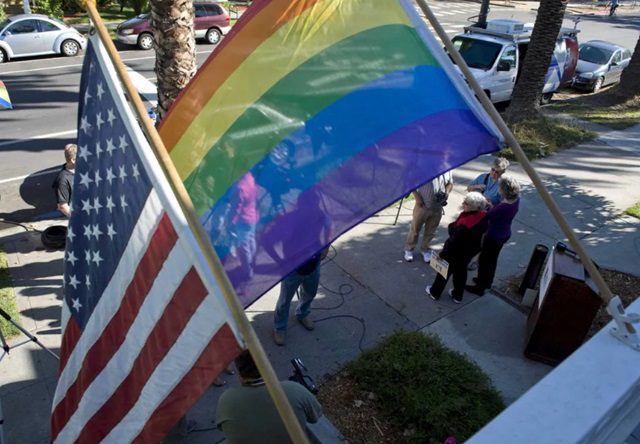BTN News: In their own home, Shalimar Boulous constantly worried about the backlash against their identity. Boulous identifies as genderqueer, uses the pronoun they, and came out before turning 30. They faced intense episodes of depression and anxiety while navigating their identity and struggled with gender dysphoria. However, Boulous found solace and acceptance within the LGBTQ+ community. This support helped them understand they were enough, even in their lowest moments.
Boulous now works in social services at the Sacramento LGBT Community Center, assisting young LGBTQ+ individuals facing similar challenges. This support is crucial, as The Trevor Project, a nonprofit organization focused on LGBTQ+ mental health and suicide prevention, estimates that over 1.8 million LGBTQ+ youths contemplate suicide each year, with an attempt occurring every 45 seconds in the United States.
Mental Health Resources in Sacramento
Given the rising mental health issues and suicide rates among LGBTQ+ youth, here are some nonprofit organizations in Sacramento offering counseling and emergency resources.
Sacramento LGBT Community Center
Located at 1015 20th St. in downtown Sacramento, the Sacramento LGBT Community Center provides counseling services Monday through Friday in both English and Spanish. The center also offers various community support groups and addiction recovery programs. Additionally, it provides emergency housing for LGBTQ+ young adults aged 18 to 24, accommodating homeless youths for short-term (90 days) to long-term (up to two years) stays.
“Unfortunately, many LGBTQ+ youths become homeless because their families reject them due to their gender identity or sexual orientation,” said Jaime Gerigk, the center’s program director.
The center also features the Q-Spot, a respite center for LGBTQ+ youth aged 14 to 24. The Q-Spot offers a safe and affirming space where youths can access food, clothing, showers, and a place to relax. They can also receive confidential healthcare services and testing for sexually transmitted infections and HIV.
Gender Health Center
The Gender Health Center, located at 3823 V St. in Sacramento’s Elmhurst neighborhood, offers free counseling services for youths aged 12 and up. Counseling can be provided with or without parental consent. The program is run by 14 interns, who are master’s level university students trained in gender-affirming care, supervised by Sara Seberger, the center’s mental health director.
The center also assesses letters for youths seeking gender transition surgeries, such as hormone blockers or hormone replacement therapy. To receive transition care, an individual must have a support letter from a clinician, explained Seberger.
Seberger also recommends the Trans Lifeline, a hotline that connects transgender individuals with resources and services. The hotline can be reached at 877-565-8860. The Trevor Project also offers a hotline for LGBTQ+ youth, available at 1-866-488-7386.
The Mental Health Crisis Among LGBTQ+ Youth
In 2020, a mental health crisis emerged among youths across the United States, with anxiety and depression symptoms doubling in teenagers, according to the National Library of Medicine. Although mental health issues are beginning to decrease, LGBTQ+ youth continue to struggle, as reported by Axios. These young people face a higher risk of suicide due to persistent social stigma. The Trevor Project found that 37% of gay and lesbian youths have seriously considered suicide, and 19% have attempted it, compared to much lower rates among heterosexual youths, where 14% consider and 6% attempt suicide.
The rising mental health issues and suicide tendencies among LGBTQ+ youth reflect the current political climate, stated Ariela Cuéllar, a communications specialist with the California LGBTQ Health and Human Services Network. For instance, there are over 600 bills in the United States deemed anti-transgender, according to the Trans Legislation Tracker, an independent research group.
All these factors contribute to LGBTQ+ youths feeling unworthy and as if they “don’t belong in this world,” said Cuéllar. External factors and societal mistreatment and stigmatization by peers, the healthcare system, and even within their own communities exacerbate these feelings.
For instance, nonbinary and transgender youths often face gender dysphoria when forced to conform to their birth gender standards. It’s not just about fitting in; it’s about safety.
“There’s pressure from family, society, and peers to present according to the gender role that matches the gender assigned at birth,” said Seberger. “But if that doesn’t feel right, and they don’t have supportive words or the knowledge that there are other options, they feel really isolated.”
LGBTQ+ youth are always navigating these situations and remain on high alert to ensure their identity and presentation are safe. This constant vigilance is a significant stressor for a child.
Comprehensive Support Beyond Counseling
Mental health and suicide prevention resources extend beyond counseling, said several community center leaders. Programs that address other contributing factors to mental illness, such as homelessness, food insecurity, or addiction, are also considered suicide prevention.
“Creating more resources like these in Sacramento can prevent suicide,” said Cuéllar.
Conclusion
Support systems and resources are crucial for LGBTQ+ youth facing mental health challenges. With the help of community centers like the Sacramento LGBT Community Center and the Gender Health Center, these young individuals can find the support and acceptance they need to thrive. It’s essential to continue expanding and promoting these resources to ensure the well-being of all LGBTQ+ youth in Sacramento and beyond.


